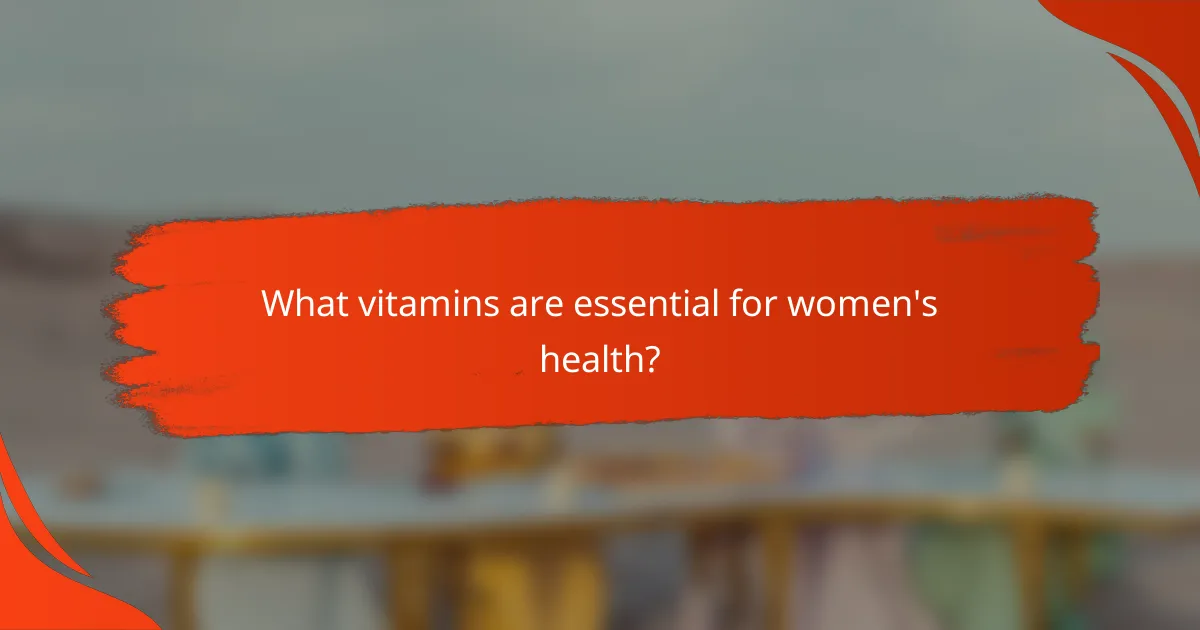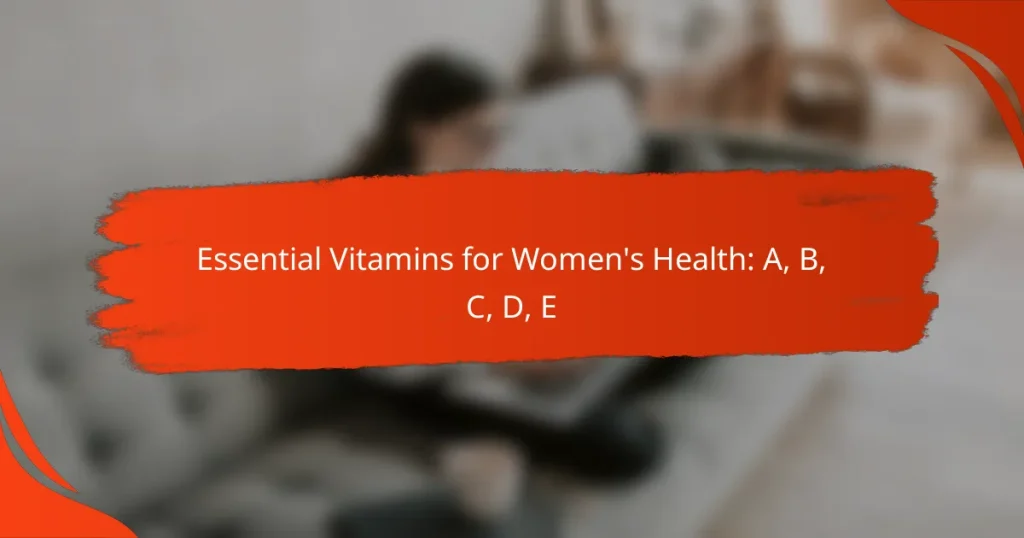Essential vitamins A, B, C, D, and E are vital for women’s health, each contributing uniquely to overall well-being. These nutrients support functions such as immune health, vision, energy levels, and hormonal balance, making them crucial for maintaining a healthy lifestyle. Understanding the recommended daily allowances for these vitamins can help women meet their specific nutritional needs effectively.

What vitamins are essential for women’s health?
Essential vitamins for women’s health include A, B, C, D, and E, each playing a crucial role in maintaining overall well-being. These vitamins support various bodily functions, from immune health to bone strength, and are vital for women’s unique nutritional needs.
Vitamin A benefits for women
Vitamin A is important for maintaining healthy vision, skin, and immune function. It supports reproductive health and is essential during pregnancy for fetal development. Women can obtain vitamin A from sources like carrots, sweet potatoes, and leafy greens.
For optimal health, women should aim for a daily intake of about 700 micrograms of retinol activity equivalents (RAE). However, excessive intake can lead to toxicity, so it’s best to focus on a balanced diet.
Vitamin B complex importance
The B complex vitamins, which include B1, B2, B3, B5, B6, B7, B9, and B12, are vital for energy production, brain function, and the formation of red blood cells. They help in reducing fatigue and improving mood, which is particularly beneficial for women managing busy lifestyles.
Women should ensure they get adequate amounts of these vitamins through whole grains, legumes, eggs, and dark leafy vegetables. A daily multivitamin may be considered, especially for those with dietary restrictions.
Vitamin C role in immunity
Vitamin C is a powerful antioxidant that plays a crucial role in supporting the immune system. It helps protect cells from damage and enhances the absorption of iron from plant-based foods, which is particularly important for women.
To meet the recommended daily intake of about 75 milligrams, women should include citrus fruits, strawberries, and bell peppers in their diets. Regular consumption can help reduce the duration and severity of colds.
Vitamin D and bone health
Vitamin D is essential for calcium absorption and bone health, making it particularly important for women, especially post-menopause. It helps prevent osteoporosis and supports muscle function.
Women should aim for a daily intake of around 600 to 800 IU, depending on age and health status. Sun exposure is a natural source, but dietary sources like fatty fish and fortified dairy products are also beneficial.
Vitamin E as an antioxidant
Vitamin E acts as a potent antioxidant, protecting cells from oxidative stress and supporting skin health. It also plays a role in immune function and may help reduce the risk of chronic diseases.
Women should aim for a daily intake of about 15 milligrams, which can be obtained from nuts, seeds, and vegetable oils. Including a variety of these foods in the diet can help maintain adequate levels of vitamin E.

How do vitamins A, B, C, D, and E support women’s health?
Vitamins A, B, C, D, and E play crucial roles in supporting various aspects of women’s health, including vision, energy levels, skin health, and hormonal balance. Each vitamin contributes uniquely to overall well-being, making them essential for maintaining a healthy lifestyle.
Vitamin A for vision and skin
Vitamin A is vital for maintaining healthy vision and skin. It helps in the formation of rhodopsin, a protein in the eyes that enables night vision, and supports the integrity of skin cells, promoting a clear complexion.
Women should aim for a daily intake of around 700 micrograms of retinol activity equivalents (RAE). Foods rich in vitamin A include carrots, sweet potatoes, and spinach, which can easily be incorporated into meals.
Vitamin B for energy and mood
The B vitamins, including B1, B2, B3, B6, and B12, are essential for energy production and mood regulation. They assist in converting food into energy and are crucial for the synthesis of neurotransmitters that influence mood and cognitive function.
A balanced diet featuring whole grains, legumes, nuts, and leafy greens can help meet the recommended daily intake of B vitamins. Women should be particularly mindful of B12, especially if following a vegetarian or vegan diet, as it is primarily found in animal products.
Vitamin C for collagen production
Vitamin C is essential for collagen synthesis, which is crucial for skin elasticity and overall skin health. It also acts as a powerful antioxidant, protecting the skin from damage caused by free radicals.
Women should aim for about 75 milligrams of vitamin C daily. Citrus fruits, strawberries, and bell peppers are excellent sources, making it easy to include in a daily diet.
Vitamin D for hormonal balance
Vitamin D plays a significant role in maintaining hormonal balance, particularly in regulating the menstrual cycle and supporting reproductive health. It also aids in calcium absorption, which is vital for bone health.
Women should strive for a daily intake of approximately 600 to 800 International Units (IU) of vitamin D. Sun exposure is a natural source, but fortified foods and supplements can help meet these needs, especially in regions with limited sunlight.
Vitamin E for skin health
Vitamin E is known for its antioxidant properties, which help protect the skin from oxidative stress and UV damage. It also supports skin hydration and can aid in the healing of scars and blemishes.
A daily intake of about 15 milligrams is recommended for women. Nuts, seeds, and green leafy vegetables are rich in vitamin E and can be easily added to snacks and meals for enhanced skin health.

What are the recommended daily allowances for these vitamins?
The recommended daily allowances (RDAs) for essential vitamins vary based on age, health status, and specific needs of women. Understanding these guidelines helps ensure adequate intake for optimal health and wellness.
Vitamin A RDA for women
The RDA for Vitamin A in women is approximately 700 micrograms (mcg) of retinol activity equivalents (RAE) per day. This vitamin is crucial for vision, immune function, and skin health.
Women who are pregnant or breastfeeding may require higher amounts, so it’s important to consult with a healthcare provider for personalized recommendations.
Vitamin B complex RDA
The B vitamins encompass several nutrients, each with its own RDA. For instance, women typically need about 1.1 milligrams (mg) of thiamine (B1), 1.1 mg of riboflavin (B2), and 14 mg of niacin (B3) daily.
Folate (B9) is particularly important for women of childbearing age, with an RDA of 400 mcg to support fetal development. A balanced diet rich in whole grains, legumes, and leafy greens can help meet these needs.
Vitamin C RDA for women
The RDA for Vitamin C in women is 75 mg per day. This vitamin is vital for collagen production, immune function, and antioxidant protection.
Fruits and vegetables, such as oranges, strawberries, and bell peppers, are excellent sources of Vitamin C. Regular consumption can help meet the daily requirement easily.
Vitamin D RDA for women
Women generally require about 600 international units (IU) of Vitamin D daily, which increases to 800 IU for those over 70 years old. Vitamin D is essential for calcium absorption and bone health.
Sunlight exposure can help the body produce Vitamin D, but dietary sources like fatty fish and fortified foods are also important, especially in regions with limited sunlight.
Vitamin E RDA for women
The RDA for Vitamin E in women is 15 mg per day. This vitamin acts as an antioxidant, protecting cells from damage and supporting immune function.
Foods rich in Vitamin E include nuts, seeds, and vegetable oils. Incorporating these into your diet can help ensure adequate intake of this essential nutrient.

How can women ensure they get enough essential vitamins?
Women can ensure they get enough essential vitamins by consuming a balanced diet rich in fruits, vegetables, whole grains, and lean proteins. Regularly incorporating a variety of these foods helps meet daily vitamin requirements and supports overall health.
Food sources of Vitamin A
Vitamin A is crucial for vision, immune function, and skin health. Women can obtain this vitamin from both animal and plant sources. Foods rich in Vitamin A include liver, fish, dairy products, and colorful fruits and vegetables like carrots, sweet potatoes, and spinach.
To maximize Vitamin A intake, aim for a mix of these sources. For instance, including a serving of leafy greens or orange vegetables in meals can significantly boost your levels. The recommended dietary allowance (RDA) for adult women is around 700 micrograms per day.
Best sources of Vitamin B
Vitamin B encompasses a group of vitamins that play vital roles in energy production and brain health. Key B vitamins include B1 (thiamine), B2 (riboflavin), B3 (niacin), B6, B9 (folate), and B12. Women can find these vitamins in whole grains, legumes, eggs, dairy, meat, and leafy greens.
To ensure adequate intake, consider incorporating a variety of these foods into your diet. For example, a breakfast of whole grain toast with eggs and a side of fruit can provide several B vitamins. The recommended intake varies by specific vitamin, but generally, a balanced diet should cover these needs effectively.


